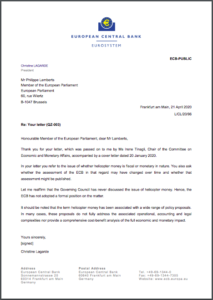Over the past years, the ECB has always mindfully avoided rejecting helicopter money on legal grounds. This view was reaffirmed by Christine Lagarde in a recent letter to one MEP, who argued that more research on the topic is needed.
 On April 21, the ECB released a letter from Christine Lagarde to the Member of the European Parliament Philippe Lamberts, who inquired whether the ECB had carried out an assessment of helicopter money.
On April 21, the ECB released a letter from Christine Lagarde to the Member of the European Parliament Philippe Lamberts, who inquired whether the ECB had carried out an assessment of helicopter money.
Her response has been interpreted as a rejection of helicopter money, but this is a mis-reading of the letter. Instead, she suggests a lack of research on the topic, stating that the Governing Council of the ECB has never gathered and discussed the matter.
To fully understand the context behind the letter and its meaning, it’s useful to recap the four years of interaction between the ECB and MEPs on this sensitive topic.
“Helicopter money is a very interesting concept”
In 2016, Mario Draghi had declared in a letter to Fabio De Masi that “helicopter money was a very interesting concept”, but maintained that the ECB was not considering its inclusion in the toolkit. Later that year, a group of 18 MEPs (including Philippe Lamberts) signed an open letter to Draghi, urging the ECB to study the viability and implementation of helicopter money.
Then, a few months later, following a series of letters between S&D MEP Jonás Fernández and Mario Draghi, the ECB released the most detailed answer on the question of the legality of helicopter money.
In the letter, Draghi said:
“While the governments of euro area countries would not be the direct recipients of a cash transfer involved in such a scheme, legal complexities could still arise if the scheme could be seen as the ECB financing an obligation of the public sector vis-à-vis third parties, as this would also violate the prohibition of monetary financing. In order to determine what constitutes a form of financing of the public sector’s obligations vis-à-vis third parties, an assessment has to be made of whether the task concerned is a central bank or a government task, i.e. a task falling within the responsibility of the Member State institutions mentioned in Article 123 of the Treaty.”
Our interpretation of the letter is very clear – helicopter money is legal as long as the transfer does not substitute public institution’s “financial obligations to third parties”, such as social benefits payments or pensions.
The ECB considers that “an assessment has to be made of whether the task concerned is a central bank or a government task.” Under this ambiguous sentence, the ECB seems to indicate that an ad-hoc assessment would be required to check that the cash transfers would not constitute a “task” that would otherwise fall within the remit of governments’ budgetary policies.
But this situation is not only very hypothetical, it would work against the very purpose of helicopter money, which is to boost spending in the economy. If helicopter money payments replaced the government’s social transfers to households, this would effectively neutralize the stimulus effect of the policy. In other words, the nature of helicopter money is to supplement the government’s spending – not replace it.
Draghi’s letter confirmed that the way Positive Money Europe proposes to implement helicopter money in the Eurozone would be legally feasible, as it would be designed and supervised independently under the ECB’s own initiative. It would be possible for Member States to provide administrative support, but this would not interfere with their budgets. Moreover, helicopter money should not hamper the ECB’s inflation target and its long-term ability to manage monetary policy.
Is helicopter money a fiscal task after all?
In view of the ECB’s November 2016 letter to Fernández, we thought the legal case was solved. But the saga continued until the very last weeks of Draghi’s mandate as ECB president. In September 2019, during his last Monetary Dialogue with MEPs from the European Parliament’s ECON Committee, Mario Draghi said to Philippe Lamberts: “Let’s keep in mind all the times that giving money to people in whatever form, it’s a fiscal policy task, it’s not a monetary policy task.” In light of the previous letter to Fernández, this statement could have implied that an assessment of helicopter money had been made, and the ECB had closed its doors to this policy tool.
Or has it? To clarify, MEP Lamberts sent another question, asking whether the ECB had carried out a thorough assessment of helicopter money.
This is the question to which Lagarde replied last week. In it, the current ECB President writes that the ECB “has not adopted a formal position on the matter”, therefore backtracking on Draghi’s own view that helicopter money would be a fiscal task, not a monetary task.
For this reason, the letter from Lagarde must not be regarded as a formal rejection of helicopter money.
The ECB never rejected Helicopter Money
Positive Money Europe has worked tirelessly with MEPs in recent years by assisting with countless written and oral questions on the topic. On none of these occasions did the ECB reject the idea of helicopter money. If anything, one can only conclude that the ECB is very mindful of the fact that it may need to use helicopter money in the future and it is, therefore, careful enough not to rule it out.
Besides, when Lagarde says that the ECB Governing Council has not discussed helicopter money yet, this only applies to the monthly meetings of the Governing Council. Hence the ECB employees may have carried out some sort of preparatory work on the topic.
Finally, Lagarde rightly states that helicopter money “proposals do not fully address the associated operational, accounting and legal complexities nor provide a comprehensive cost-benefit analysis of the full economic and monetary impact”.
Since 2015, Positive Money Europe has been calling on the ECB to carry out a careful examination of helicopter money and to publish studies to contribute to a healthy debate on this unconventional tool. Disappointingly, since 2016 the ECB has either not done its homework, or they haven’t published their research on this.
It is time for the ECB to deliver its share of the work in this debate. As a matter of fact, no organisation is better positioned than the ECB itself to fill the gap and evaluate the comprehensive cost-benefit analysis of the full economic and monetary impact of helicopter money. Similarly, the European Parliament’s ECON Committee also has a duty to contribute with its resources to prompt further research and debate on this matter.


Very inspiring article! I am excited to learn that Positive Money has such good connections to MEPs.
Allow me to present my vision of a post-covid19-society’s foundation: Freedom Money.
It combines the idea of helicopter money with CBDC and builds on the observation that multi-purpose money does not work (see the futile QE-programme). For spending purposes one needs a parallel currency that regularly loses its value – let’s call it C-Euro.
The ECB should provide parallel accounts for every private and business account in Euro-land – the C-accounts. (The states and other public authorities do not participate.)
Every month C-Euro 300.- are deposited into the citizens’ account. Every midnight all the C-accounts lose their value by 0.4 percent.
These two parameters are sufficient to control inflation.
After the effects of the system have been studied one can rise the C-Euro 300.- to 700.- and later 1200.- or 1500.- – the full UBI.
I would very much like to explain the details in a full article and discuss the feasibility. Please give me advice how to proceed.
Thank you.
If I understood correctly you’re proposing sovereign money creation and a demurrage on currency. Like the proposals of Silvio Gesell. I like it.